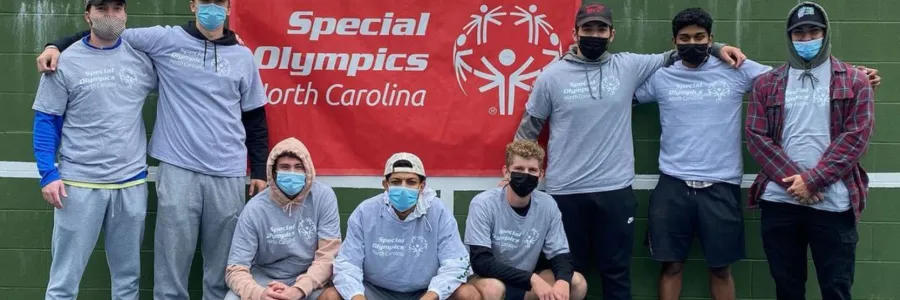By Wyatt Crosher, Communications Coordinator for Student Affairs
This is the final story of a three-part series highlighting the best of what Fraternity & Sorority Life at UNC Charlotte has to offer. The first story is focused on community, and the second is on student success.
Fraternity and sorority life comes in different shapes and sizes at universities across the country. Regardless, there are still the same stereotypes that come to mind for many when thinking about what the Greek community looks like at colleges.
Tate Leonard is aware of this. As president of the Chi Phi fraternity and UNC Charlotte’s Interfraternity Council, Leonard said one of his main initiatives is to break that mold at the University.
“The stigma for national fraternities, in general, is really bad,” Leonard said. “The goal for a lot of the chapter presidents is to relieve this stigma. We want to be more professional. We are a social fraternity, so we are going to have social events, but a lot of the fraternities have taken a more community-driven focus and it's really exciting.”
That focus on the Charlotte community has been taken up by the University’s Fraternity and Sorority Life as a whole.
Falena Salcedo, president of the Independent Greek Council, said she likes seeing how diverse the Greek community is with how each give back.
"Everyone has such different philanthropies, and it's really awesome to see how they work individually and how they work together,” Salcedo said. “It's cool how all of our work goes to various different causes.”
Philanthropic endeavors taken on by fraternities and sororities at Charlotte range from Phi Delta Theta’s work with ALS to Delta Phi Lambda’s efforts against human trafficking.
The full list of Charlotte’s Fraternity and Sorority Life philanthropies can be found here.
Danyal Mahmud is the event coordinator for Lambda Upsilon Lambda and president of the Diversified Greek Council. His favorite event he’s helped to create was called “That’s Not My Name” that focused on name mispronunciation among marginalized communities.
That event, which was done in collaboration with the Chi Upsilon Sigma and Delta Sigma Theta sororities, is a highlight for Mahmud, and is an example of a way that fraternity and sorority life can make a positive impact.
"That was one of my favorite events because we had such a huge turnout and we were able to create a space for that open dialogue where participants felt comfortable sharing their unique experiences with a particular subject matter that I don't think is talked about that often,” Mahmud said. “That's my favorite thing about event planning, being able to create events that are of significance and promote the discussions on topics that aren't being had as much.”
Events, like the philanthropies that spark them, come in all shapes and sizes at Charlotte. Leonard mentioned a car smash event that allowed students to take part in destroying a car for a $5 price tag that ended with $4,000 donated to the Boys and Girls Club to provide after-school programs to children. He also said that his fraternity partnered with RAINN (Rape, Abuse and Incest National Network) last year, raising $3,500.
Just last month, Sigma Alpha Epsilon partnered with three fraternities to raise money for the St. Baldrick’s Foundation to fight childhood cancer. More than 20 fraternity members shaved their heads, and more than $23,000 has been raised.
It’s events like these that make Charlotte’s Greek community special, according to Emma Boger, president of the Panhellenic Executive Board. While the fraternities and sororities do have national philanthropies, the ones at Charlotte are taking an extra step.
"Going out into the community is the biggest thing, because not only do we have national philanthropic efforts, but we also have community efforts,” Boger said. “I think every single chapter does a great job of making sure that yes, they're seeing what they do nationally, but they're also putting right back into the community. You can see it directly with how many people come out to things. It's not just Greek Life people stopping by our table. It's everybody doing everything."
Boger also said the smaller population of fraternity and sorority students at Charlotte makes inclusion more of a necessity. With 1,616 members as of Fall 2021, Charlotte’s Greek community makes up about 5% of the more than 30,000 students at the University.
"We go out and we find different ways to be involved. We're some of the most involved people,” Boger said. “We know that we require other involvement outside of the sorority, so it pulls people in that usually wouldn't be a part of Greek Life. It's about building beyond the Greek community and reaching past it because we are smaller, so we want to be involved in other things and meet more people.
The stigmas surrounding fraternities and sororities may continue to exist, but those involved in Charlotte’s Fraternity and Sorority Life continue to fight against them.
As Boger states, “By going out and being involved in so many things, I think people's idea of what Greek Life is changes from the moment they come to this school.”
Photo Credit: Sigma Tau Gamma's Instagram
For more info on Fraternity and Sorority Life at UNC Charlotte, go to the Office of Fraternity and Sorority Life’s website here.
